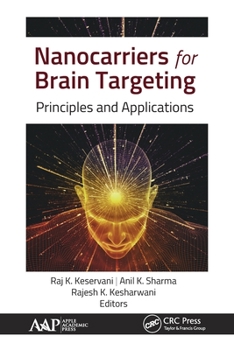Nanocarriers for Brain Targeting: Principles and Applications
This new volume, Nanocarriers for Brain Targeting: Principles and Applications, covers recent research on brain physiology and the development of drug delivery systems. It explores a diverse variety of strategies that can be employed to achieve drug targeting to the brain. The nanocarriers that are discussed include nanoparticles, vesicular carriers, carriers having carbon as a core constituent, dispersed systems, and more.
The inherent anatomy and physiology of the brain renders it different from other organs. The past few decades have witnessed significant research on brain ailments in response to a majority of hospitalizations that occur due to age-related central nervous system disorders. The prevalence of diverse diseases such as Alzheimer's disease, Parkinson's disease, amyotrophic lateral sclerosis, multiple sclerosis, HIV-dementia, etc., affect about 1.5 billion people globally, which is further anticipated to reach 1.9 billion by the year 2020. Nanocarriers for drug delivery to the brain are seen as one of the answers to this growing problem.





